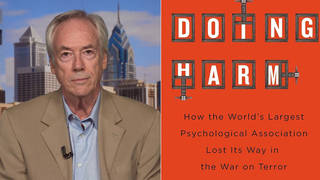
Guests
- Mary Pipherauthor of numerous books, including Reviving Ophelia, which remained on the New York Times best-seller list for 154 weeks. She joins us now from Lincoln, Nebraska, where she lives.
Renowned psychologist and New York Times best-selling author Mary Pipher decided last week to return her Presidential Citation award from the APA in protest. In a letter to the group’s president, she wrote, “I have struggled for many months with this decision and I make it with pain and sorrow. … I do not want an award from an organization that sanctions its members’ participation in the enhanced interrogations at CIA 'black sites' and at Guantanamo.” [includes rush transcript]
Transcript
AMY GOODMAN: The American Psychological Association has come under public criticism once again over its endorsement of professional involvement in CIA and military interrogations.
At its annual convention just over a week ago, the APA’s policymaking council voted overwhelmingly to reject a measure that would have banned its members from participating in interrogations at Guantanamo Bay and other U.S. detention centers. In the days since the convention ended, the Houston Chronicle, one of the nation’s most widely read newspapers, criticized the move in an editorial, writing, “Psychologists have no place assisting interrogations at places such as Guantanamo Bay.”
Then in an even more dramatic development, renowned psychologist and New York Times best-selling author Mary Pipher decided to return her Presidential Citation award from the APA in protest. In a letter to the group’s president, she wrote, “I have struggled for many months with this decision and I make it with pain and sorrow. … I do not want an award from an organization that sanctions its members’ participation in the enhanced interrogations at CIA 'black sites' and at Guantanamo.”
Mary Pipher is author of a number of books, including Reviving Ophelia, which has remained on the New York Times best-seller list for 154 weeks. She joins us now from Lincoln, Nebraska, where she lives. Welcome to Democracy Now!, Mary Pipher.
MARY PIPHER: Hello. Thank you very much, Amy. I’m honored to be on your show.
AMY GOODMAN: Can you talk about this decision you have come to and how you came to it, to return your Presidential Citation to the American Psychological Association?
MARY PIPHER: You know, it’s a life decision. There’s childhood aspects, there’s my adult life as a person who’s worked with traumatized people. And then there’s the last week.
Speaking first of the last week, Amy, I heard your show last Monday. And I was aware of this issue. I had read the Jane Mayer article in The New Yorker. I read the Vanity Fair article. But when I heard your show and then looked up the Substitute Motion Three, that basically allowed psychologists to continue participating in interrogations, I really felt that I had a moral choice to make. And I no longer wanted to be associated with APA.
I also have been in the public eye enough that I realized if I just wrote a letter to APA, it would fall in a black hole, which in fact it did — I’ve never had a response from them — that I also wanted to make a few calls to people and let them know I was doing this, so that my fervent hope by my action is two things: one, that American Psychological Association will rapidly rethink what I consider a terrible mistake and regain its position as a helping organization and regain its respect among other helping organizations, such as the American Medical Association, American Psychiatric Association, who do not permit their members to work in many of the places psychologists are now working; the other thing is, psychologists at this point are the only people who are giving the CIA and President Bush legitimacy for the kinds of behaviors that are occurring in Guantanamo, Abu Ghraib, the black sites, and so on, because when he’s asked about those things, why is this different, say, than Egypt or the Congo, his answer is, “We have a medical supervisors who are overseeing the interrogations.” In fact, psychologists are those medical supervisors.
So if we can rapidly change Substitute Motion Three, if we can take a very strong stand on banning participation of members at these places, it will be all over. There won’t be —
AMY GOODMAN: Dr. Mary Pipher, I want to thank you for joining us. We’re going to continue the conversation after — has returned her award to the American Psychological Association, author of Reviving Ophelia.













Media Options